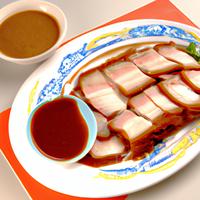
1 serving (100 grams) contains 300 calories, 20.0 grams of protein, 25.0 grams of fat, and 0.0 grams of carbohydrates.

Log this food in SnapCalorie

Nutrition Information
Calories |
750 | ||
|---|---|---|---|
% Daily Value* |
|||
| Total Fat | 62.5 g | 80% | |
| Saturated Fat | 20 g | 100% | |
| Polyunsaturated Fat | 0 g | ||
| Cholesterol | 175 mg | 58% | |
| Sodium | 1250 mg | 54% | |
| Total Carbohydrates | 0 g | 0% | |
| Dietary Fiber | 0 g | 0% | |
| Sugars | 0 g | ||
| protein | 50 g | 100% | |
| Vitamin D | 0 mcg | 0% | |
| Calcium | 25 mg | 1% | |
| Iron | 2.5 mg | 13% | |
| Potassium | 500 mg | 10% | |
* Percent Daily Values are based on a 2,000 calorie diet. Your daily values may be higher or lower depending on your calorie needs.
Food Attributes
Source of Calories
About Siew yok
Siew Yok, also known as Cantonese roasted pork belly, is a savory delicacy from Chinese cuisine renowned for its crispy skin and succulent, flavorful meat. It is traditionally prepared by marinating pork belly in a blend of spices, including five-spice powder, garlic, and soy sauce, and roasting it to perfection. The outer layer becomes golden and crackly, while the interior remains tender and juicy. While Siew Yok is an excellent source of protein, it is also high in fat, particularly saturated fat, due to the pork belly cut. This makes it a calorie-dense option, and moderation is key for those mindful of their diet. Additionally, depending on the marinade, sodium content can be substantial, which is worth considering for heart health. Despite its rich taste and indulgent texture, it’s best enjoyed occasionally as part of a balanced and varied diet.



